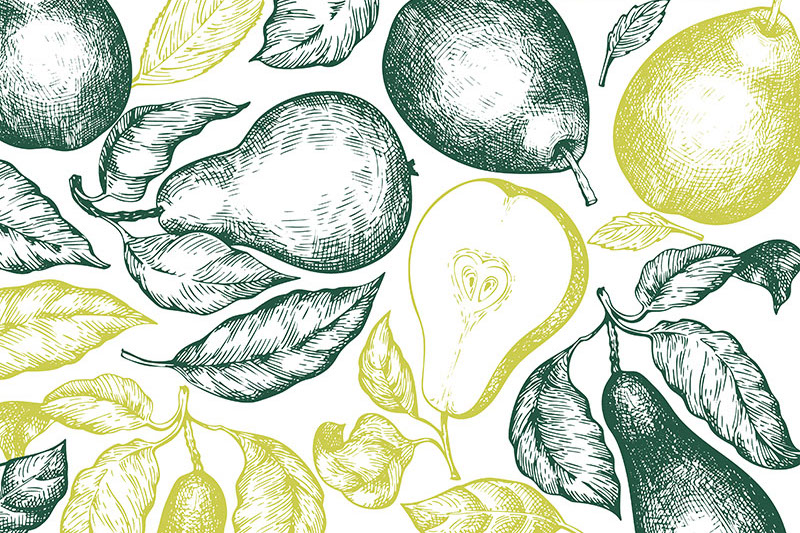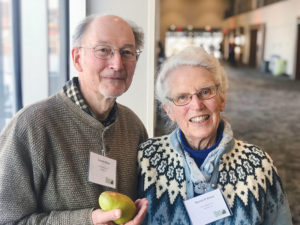
Apr 7, 2022
MOSES Organic Farming Conference highlights pear production
At the MOSES Organic Farming Conference in LaCrosse, Wisconsin, pear varieties, cut flower seeds, compost and the state’s signature cheese were highlighted.
For an extended pear season, plant early-season Summercrisp, mid-season Luscious, and late-season Harrow Sweet, recommends David Sliwa, a seasoned Iowa pear grower since the 1990s.
Sliwa and his wife, Priscilla “Perry-O” Perry, facilitated a pear roundtable discussion at the 33rd annual meeting, which occurred Feb. 24-26. About 50 growers packed the Friday afternoon pear discussion room, with some sitting on the floor.
Overall, Sliwa is a big fan of Luscious pears, most likely a hybrid between Harbin and European pears, which was introduced in the U.S. in 1967.
“Once people taste it, they are hooked,” he said. “Yes, the Luscious pear lacks immediate eye appeal, but once tasted brings customers back for its intense pleasurable flavor.”
A perfectly ripe Bartlett, of course, is the standard for pears, Sliwa said. But, Bartlett pear trees rate only a three on the USDA scale of fire blight resistance (scale of 1 to 10, with 10 being the most resistant). By comparison, resistant varieties such as Luscious, Summercrisp and Harrow Sweet, rate six to 10 on the scale.

“As organic growers, this gives us a leg up on success,” said Sliwa, whose orchard consists of more than 100 pear trees of 35 different varieties. Sliwa made a conscious choice decades ago to follow the less-traveled path of growing pears over apples, as there already seemed to be plenty of apple orchards in the area.
Overall, organic pear growers should choose pear varieties that deliver delicious, melting, sweet and juicy fruit. The trees should also be productive and disease resistant, tolerant of insects and mites, and robust under a wide range of weather and site conditions.
After surveying 15 Upper Midwest orchards, Sliwa said Luscious tops the list of varieties grown, followed by Gourmet, Harrow Sweet, Moonglow, Patten, Summercrisp, Bosc and Red Clapp’s Favorite. Newer fire blight resistant varieties include three pear trees released in 2021: early-season Happi and Juicy Jewel, plus early-to-mid-season Bell.
One father and son team who attended the roundtable discussion shared their solution to preventing spring hail storms from knocking off their pear blossoms.
“All the blossoms are on the ground,” said Hunter Cardinal after a typical Minnesota spring storm.
This would, unfortunately, lead to no fruit later in the year.
Hunter’s dad Butch said they devised a workaround for potential inclement weather by banking snow topped by straw around the base of the trees. This prolongs dormancy for a few weeks, and delays flowering until the coast is clear of weather threats. The height of the snowbanks varies with the amount of unmelted snow they have to work with.
The Cardinal family grows fruit and vegetables on their certified-organic, 38-acre farm and store called All Good Organics in Lino Lakes, Minnesota, about a half hour north of St. Paul.

Glad to be back in person
The pear roundtable was just one activity among many presentations, keynote speeches, workshops, films, organic meals and exhibitor facetime at the MOSES conference held in the Mississippi River town of La Crosse. La Crosse is located on the eastern bank of the Mississippi in Wisconsin, with Minnesota directly across the river and Iowa within view from surrounding bluffs.
The city is located in the Driftless Region, a dramatically hilly area left unscraped by glaciers during the last Ice Age. The region is a concentrated hotbed of organic farms. Organic Valley cooperative is based nearby in La Farge, Wisconsin, about an hour away.
“Wisconsin has the highest concentration of organic farms of any state in the nation,” said Steve Stumbras, one of the conference exhibitors with Purple Cow Organics of Middleton, Wisconsin.
Stumbras said Purple Cow has been coming to the conference for decades. Purple Cow Organics produces organic compost, growing mixes and soil amendments for both home and professional growers and farmers. It also composted waste from the conference itself.
“What you find in Wisconsin is a real collective effort … that you don’t have in other parts of the U.S.,” he said.
Cut flowers and good cheese
Another exhibitor found success and enjoyed meeting with people again after the pandemic shutdowns last year.
“This is a fantastic conference,” said exhibitor Rebecca Morse, sales and product development representative for Osborne Quality Seeds based in Washington state. Morse found value in the event held in person after it was run virtually in 2021. “Great conversations here,” she said. “It’s more about the conversations. Face to face is best; it’s really crucial. It’s about hearing what people need.” And, she added, “really good local cheese.”
Osborne Quality Seeds has been selling certified-organic seeds for over 40 years, including cover crops, herbs, vegetables and cut flowers. Morse said flowers have become popular in the past couple of years.
“There has been a boom in new cut flower farms and vegetable farms that are adding cut flowers to their production,” she said. “Consumers are more aware about buying local flowers. It also adds so much interest to a stand.”
Cut flowers offer a natural way for farms to diversify and also help with pollination, Morse added.
“As the market has expanded, we have been adding a lot of flowers,” she said.
Flower seeds from Osbourne include cosmos, delphinium, echinacea, snapdragon, sweet pea, sunflower and zinnia. Additions for 2022 include Celosia Sunday Green, Sunflower Zohar F1 and Celosia Flamingo Feather.
Business as usual
Being back in person is best, agreed exhibitor Pete Gengler, who finds he gets a lot done at the conference.
“You never know what new business you can come up with,” said Gengler, fourth-generation owner and operator with his brother Nick of Sno Pac Foods, based in Caledonia, Minnesota.
“Everybody is getting out after two years of doing nothing,” Gengler said.
He recalled the pandemic shutdowns hit just after the MOSES convention in late February 2020.
So far for 2022, he reports things look pretty much business as usual. While based in Minnesota, Sno Pac rents land and grows certified-organic fruits and vegetables in Minnesota, as well as Iowa and Wisconsin. It sells frozen fruits, vegetables and various mixes that include carrots, green peas, onions, spinach, bell peppers, sweet corn, strawberries, blueberries and even hash browns. Sno Pac’s whole cranberries come from Wisconsin, where about 60% of the nation’s cranberries are grown. The company was one of the first growers in the nation to offer edamame, Gengler said.
The MOSES Organic Farming Convention for 2023 plans to be back in downtown La Crosse at the La Crosse Center from Feb. 23-25. There were a total 1,575 attendees in 2022, both in-person and virtual, which was somewhat down from 2020, when the event was last held in person with about 2,500 attendees, according to Hannah Westfall, communications specialist for MOSES.
MOSES stands for Midwest Organic & Sustainable Education Service; it is headquartered in Spring Valley, Wisconsin






